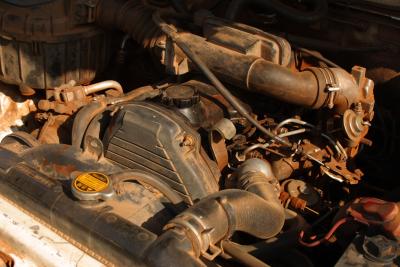
Diesel engine have spent more than a century earning their reputation for huge torque, incredible reliability, good fuel economy and versatility. Even the best of them can go bad, however, as a result of age, lack of maintenance or ill-conceived modifications. There are a few tell-tale signs exhibited by all diesels when certain problems exist.
This is problem that plagues many diesel engines, particularly those that spend a lot of time idling (as in over-the-road trucks). This smoke is generally due to oil leakage into the cylinder as a result of worn turbo bearings or worn valve-guide seals. Diesel combustion temperatures are usually high enough while driving to completely vaporize or cover up the leaking oil, but the low-cylinder temperature of an idling engine make the smoke noticeable.
White smoke is actually just a cloud of vaporized diesel, and a great deal of it is usually a sign that there is not enough heat to burn the fuel. If the problem is one or more dirty or malfunctioning glow plugs, then the smoke will usually go away after the engine heats up and begins to sustain its own combustion without them. Continuing white smoke is a sign that the fuel injectors are dirty, or that the injection timing has been over-advanced.
Think of black smoke as the second stage of white smoke. It is always a sign of a rich air/fuel ratio (excess fuel). This can have a number of causes, including leaky injectors, clogged air filter, a malfunctioning turbo, collapsed intake tube, restricted exhaust or an amateur re-programming job. A certain amount of black smoke is to be expected when the engine has been modified and additional fuel is injected, but excess black smoke indicates very high exhaust gas temperatures that can damage the turbo and engine.
Diesel is a fairly unrefined form of oil, and it should never be forgotten that that oil was at some point a rotting animal. As strange as it seems, it doesn't take much to continue the process of that fuel's bio-degradation, which is why frequent tank cleanings are so vital. Biodegraded diesel fuel will start as a sort of slimy film on the walls of the tanks, which eventually forms solid lumps in the fuel. Degraded diesel fuel also serves as an excellent growth medium for bacteria, molds, yeast and fungi, which all contribute contaminants and cause the fuel to take on a sort of rancid cottage-cheese texture.
These lumps clog filters and injectors, and will cause power loss and excess smoking. Other signs of bad fuel are corroded and pitted injectors, a slimy film in the fuel filter and a noxious stench that resembles rotting eggs and road-kill.